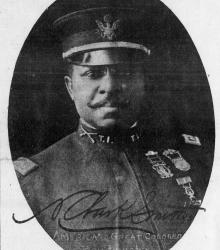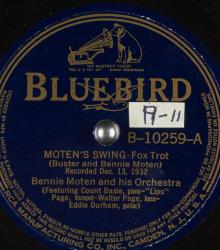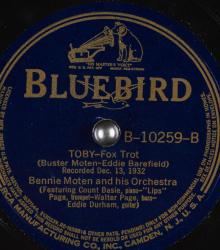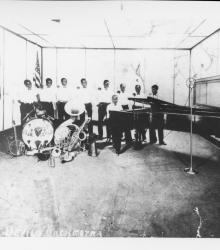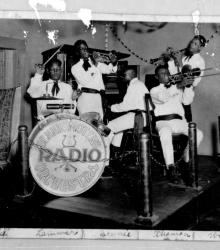Harlan Leonard once described N. Clark Smith’s impressive persona as the segregated Lincoln High School’s band leader in Kansas City, saying that Major Smith held a “commanding personality”: “He was short, chubby, gruff, military in bearing, wore glasses, and was never seen without his full uniform and decorations. His language was rather rough and occasionally shocking to the few young ladies who were taking music classes, though never offensive. Major Smith simply ran a tight ship. . . . He drilled the Lincoln marching bands until they were the best in the area, some said the best of their kind in the Middle West.”
Page, Walter
“The black schools [in Kansas City] were much better than they had any right to be, partly because they were full of talented teachers who would have been teaching in college had they been white, and partly because Negro parents and children simply refused to be licked by segregation.” Then-reporter Roy Wilkins’s statement about education in the Kansas City area aptly summarizes the unjust obstacles that segregation created for black students, their parents, and educators at the segregated schools of Kansas City.
10" 78-rpm recording of "Moten’s Swing", a fox trot by Buster Moten and Bennie Moten, performed by Bennie Moten and his Orchestra. Members include Count Basie, piano; Oran "Hot Lips” Page, trumpet; Walter Page, bass; Eddie Durham, guitar. Matrix and catalog number: B-10259-A.
10" 78-rpm recording of "Toby", a fox trot by Buster Moten and Eddie Barefield, performed by Bennie Moten and his Orchestra. Members include Count Basie, piano; Oran "Hot Lips” Page, trumpet; Walter Page, bass; Eddie Durham, guitar. Matrix and catalog number: B-10259-B.
Group photo of Blue Devils band standing around their instruments at radio station KFJF; Oklahoma City, Oklahoma, ca. 1928. Pictured from left: Oran "Lips" Page, trumpet; Henry "Buster" Smith, alto sax; Clair Benton, banjo; Walter Page, bass; Emir "Bucket" Coleman, trombone; Jones L.
On September 23, 1923, the Bennie Moten Orchestra made its first recording consisting of eight songs. By strict musical standards, the songs themselves were unrefined and not much removed from existing blues music. But the Bennie Moten Orchestra would soon build upon its earliest recordings to develop a distinct Kansas City style of jazz that later dominated the jazz scene in the late 1930s and 1940s.
